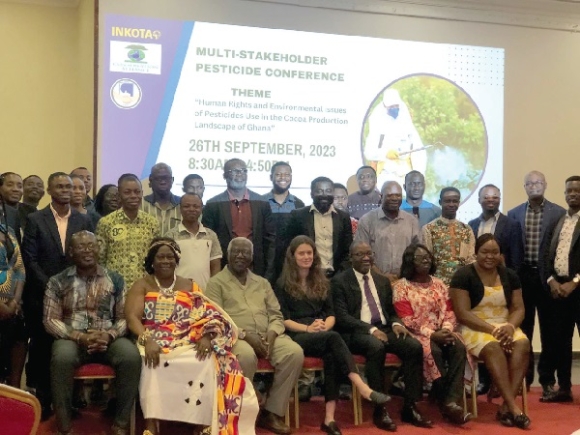
Enforce laws for proper use of pesticides by cocoa farmers — CSOs urge govt
Some Civil Society Organisations (CSOs) are demanding the enforcement of existing laws to ensure the proper use of pesticides by cocoa farmers in the country.
The CSOs claim that cocoa farmers have become over-reliant on the use of pesticides because over the years, it has been hailed as a ‘silver bullet’ to increase productivity – one of the key objectives of farmers and governments alike.
Evidence from Food and Agriculture Organisation 2021 statistics puts global annual pesticides use at 4.12 million tonnes.
It is estimated that disease and pest incidence account for output losses of about 35 per cent annually.
Majority of cocoa farmers therefore rely on chemical pesticides to manage diseases and pests, as they are often easily accessible and less labour intensive than non-chemical pest management strategies.
Some of these pesticides used contain active ingredients classified as highly hazardous pesticides (HHPs) due to the danger they pose to human health and the environment.
At the a multi-stakeholder conference on pesticides in Accra on Tuesday, the project coordinator for INKOTA Network, Juliane Biry, warned that pesticides used in cocoa production today were highly hazardous posing grave danger to cocoa farmers and the society.
The conference, on the theme: “Human Rights and Environmental Issues of Pesticides Use in Cocoa Production Landscapes of Ghana”, was organised by Conservation Alliance in partnership with SEND Ghana and INKOTA Network.
It brought together policy makers, academia, scientists and farmers to discuss how to address the consequences of over dependence of some farmers on highly hazardous pesticides.
Ms Biry said pesticides such as chlorpyriphos, thiamethoxam or imidacloprid were used by cocoa farmers in Ghana and other West African cocoa growing countries to fight pests and disease on their plantations.
She said many of the pesticides being applied on cocoa farms in Ghana have been banned in the European Union because of their grave dangers to human health and the environment.
“Yet they are still being exported from Germany, France and other European countries to countries such as Ghana.
This poses the question: why are pesticides deemed too dangerous to be used in Europe still widely used on cocoa plantations?” she quizzed.
Alternatives
Ms Biry further explained that the use of HHPs can be replaced by various alternative methods such as Integrated Pest Management, biopesticides and organic farming.
However, farmers often have little or no information about the adverse impacts of HHPs, or alternative methods, or the financial means to access the less hazardous alternatives or even reluctant to adopt improved methods of production.
A retired Professor at the Department of Plant and Environmental Biology, University of Ghana, Alfred Oteng-Yeboah, said we must put a stop to the use of harmful pesticides no matter how effective they are in productivity.
“We have done a lot of tests and found out that some chemicals are persistent on the environment after they have been used, therefore, we must stop using them no matter how effective they are,” he said.